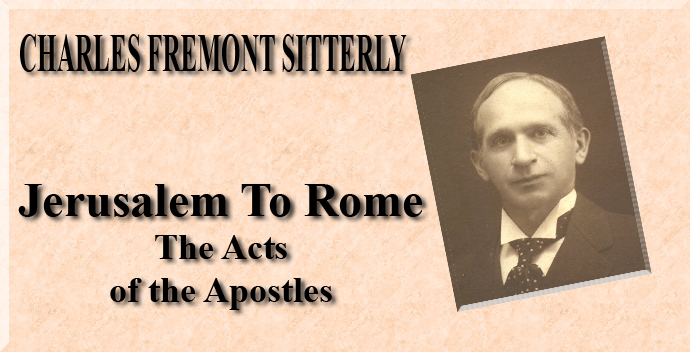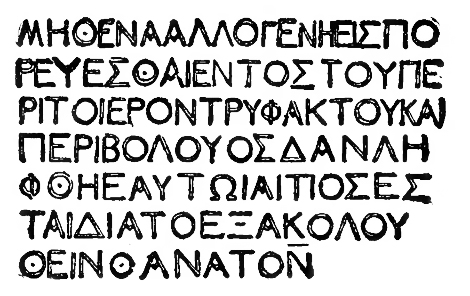|
“Brother men and fathers,’ he said, “listen to my defense, which I am about to make before you.”
When they heard that he was calling to them in Hebrew they were all the more quiet ; so he said:
“I am a Jew, born at Tarsus, in Cilicia, brought up at the feet of Gamaliel in this very city, educated in the strict manner of the law of our fathers, zealous for God just as you all are to-day. In addition, I persecuted this Way to the death, chaining and throwing into prison both men and women, as also the High Priest and all the Council can bear witness. Moreover, it was from them ‘i received letters to their brothers in Damascus, and was on my way, intending to bring back those who were there in chains to Jerusalem for punishment.
|
|
To the Jews Paul is a Jew. He begins with the Jewish salutation of the synagogue speaker. He uses the musical Aramaic or Yiddish language of the land. He emphasizes his Jewish parentage and careful education right there in Gamaliel’s lecture hall. He claims strictest respect for the observance of the Levitical law during all his early life, and was so zealous that he became chief persecutor against heretic Nazarenes. The records of the Sanhedrin would show it. Possibly some present remember the case of Stephen, whose stoning he himself had stood sponsor for. Thus it went until he left with warrants from the Sanhedrin for the arrest of Nazarene refugees as far north as Damascus. He was accompanied by a sufficient force to bring them back in chains to Jerusalem for trial. The cavalcade had rapidly crossed the country. had rounded the shoulders of Hermon, and they were within sight of their journey’s end.
|
|
“Thus as I made my journey, and was nearing Damascus, about high noon there suddenly broke from the sky a flash of great light all about me. I fell to the ground and heard a voice saying to me:
‘Saul, Saul,
why are you persecuting me?’
‘Who are you, Lord?’ I answered.
“He said to me, ‘I am Jesus, the Nazarene, whom you are persecuting.’
“Those with me observed the light but they did not hear the voice of Him who was talking to me. Then I asked,
‘What shall I do, Lord?’
“And the Lord said to me, ‘Get up and go into Damascus and there you will be told about everything you are appointed to do.’ Then, since I could not see because of the glory of that light, those who were with me took me by the hand and thus I entered Damascus. Thereupon a certain Ananias, a man strictly obedient to the law, who was highly reputed among all the resident Jews, came to me and standing before me said,
‘Saul, my brother, you can see again.’
“At once I regained sight and looked up at him. He then said:
‘The God of our fathers has appointed you to understand His will and to see the Righteous One and hear Him speak with His own lips. For you shall be a witness for Him before all men, of what you have seen and heard. And now why are you waiting? Get up and be baptized and wash away your sin, calling upon His name.” |
|
Suddenly out of the sky at high noon a flash of blinding brightness, like a bolt of lightning, felled him to the earth. But though he could see nothing about him, his inner senses were quickened a thousand-fold. He saw the Heavens open, and Jesus, as he learned, at the right hand of power, and full of grief mingled with wrath he heard Him say,
“Saul, Saul, why are you persecuting Me?”
“Of course I was humiliated and instantly penitent, and cried out in my inmost soul,
‘What shall I do, Lord?’
‘You are appointed to be henceforth my slave, as it were, among men. Your zeal must be given without stint to the Nazarene as
they call me; I am the Sovereign King. Go into Damascus and there await further orders.’
“Now those about me noticed the unusual light, but only I was struck blind, and I only had that glorious vision and heard that heavenly voice. They led me into the city, and there the chief man I had gone to arrest came and restored me my sight and gave me the orders I had been told should come. He well knew my purpose in coming to their city, but he also knew that I had surrendered all to my new Master and his. He confirmed my story that I had heard the very voice of Jesus and had seen His face, and that I should give my life henceforth to telling everywhere what I had seen and heard. That interview ended in my glad baptism into the name of my new Sovereign and Lord.”
|
|
“Now, when I had returned to Jerusalem and was praying once in the Temple I fell into a trance and saw Him, and He said to me,
‘Make haste and get quickly out of Jerusalem, because they will not accept your testimony about Me.’
‘But, Lord,’ I replied, ‘they themselves know very well how I used to imprison and to beat in all the synagogues those who were believers in You, and when they were pouring out the blood of Your martyr, Stephen, I myself was standing by, approving of it and taking charge of the clothes of those slaying him.’
“But He said to me,
‘Go forth, for I will send you far away to the Gentiles.’ ”
|
|
“On my return to Jerusalem—here in this very Temple—I was praying in the Court of the Men of Israel when in a trance I saw Jesus again. He was very peremptory, though He seemed to sympathize with my desire to atone right here for the havoc I had wrought and undo as far as I could the harm to His cause. I pleaded with Him, especially in view of my crime against Stephen, but He would not consent and said that my field was not to be here, that here my testimony would only stir up greater opposition than before and thus Breve an embarrassment rather than a help. Finally He said,
‘Make haste and depart. Your place of future witness and labor I cannot allow to be among the chosen people; you must give yourself to labor among the Gentiles.’ ”
|
|
They had listened to him up to that last utterance and then, with a shout, they burst forth:
“Away with such a person from the earth! He is not fit to live!”
So while they kept crying out and tearing off their clothing and throwing dust into the air the Commander ordered him to be brought into the castle and directed him to be examined by scourging, in order that he might find out the reason why they cried out so against him.
|
|
That Paul had succeeded in keeping control of the mob so far is no small proof of his powers. But it must not be thought that all of his audience was spellbound. Here and there fierce-eyed men move about whispering together and planning another outbreak and at the thing which seemed to Paul so humiliating, namely, his being sent away from his beloved people and city, they break loose. Not that they had any concern whether he gave his talents to the
Gentiles or not, but that his egotism implying such concern gave them a chance to jeer and so break his hold for an instant. The concerted outburst and renewed rush for the foot of the stairs on which he stood accomplished its end. The mob became conscious that its dignity was being abused, not alone by what Paul was saying, but because he in chains there was mastering their intention. The reaction is greater than could have been expected. Stark frenzy seizes them all. They leap up and down, toss up their cloaks and headgear, gnash their teeth in rage, fling pebbles and dust and bits of brick about, wave their bare arms in wild helplessness, all the while shouting at the top of their lungs: “Away with him! Kill him! Silence him! Unfit to live—to Gehenna he should go! Strangle
him! Stone him!
|
|
They had tied him up with thongs when Paul spoke to the centurion standing by:
“Is it lawful for you to scourge a Roman citizen—one uncondemned at that?”
When he heard this the centurion went and reported it to the Commander.
“What are you going to do?” he said. “This man is a Roman citizen.”
So the Commander came up to Paul and said,
“Tell me, are you a Roman citizen?”
“Yes,” he said.
“I had to pay a large sum,” replied the Commander, “for this citizenship.”
“But I was born a Roman,” said Paul.
Immediately then the men who were about to examine him went off, and even the Commander was afraid when he understood that Paul was a Roman citizen and that he had bound him. The day following, as he wished to know exactly why Paul had been accused by the Jews, the Commander unbound him, ordered the High Priests and all the Sanhedrin to assemble, and brought Paul down and placed him before them.
|
|
Again the mystified Tribune turns upon his captive.
“Bring him inside!” Then turning to a centurion, “Order the lash. See if you can get anything out of him by torture.”
Paul is stretched roughly out upon the beam and bound fast by tough bullhide thongs. The officer stands by to see the job well done.
“Does the law allow a Roman citizen to be scourged before examination or judgment?” asked Paul.
Paul knows his ground. The effect is immediate. The subordinate almost seems to enjoy the discomfiture of his chief as he says,
“Do you order us to scourge Roman citizens nowadays?”
For answer the Tribune walks rapidly across to where Paul is stretched prone for his flogging.
“Tell me, sir, is this man right? Are you a Roman?”
“Yes,” says Paul.
That one word brought him respect, protection, years of life, not once nor twice. The scourgers dropped their tools of torture, unbound their victim, not roughly now, and as they retired heard their Commander say,
“Do you know that my citizenship cost me a great deal of good gold?”
“No doubt,” replied Paul, “but my citizenship is part of my native heritage.”
That night the Tribune determined to go more deeply into the case, and Paul had a friend at court.
A quick order is issued for the chief Jewish leaders to meet him next day for an examination and inquiry into the meaning of the uproar.
|



 Home
Home What's New
What's New Bible
Bible Photos
Photos Hiking
Hiking E-Books
E-Books Genealogy
Genealogy Profile
Free Plug-ins You May Need
Profile
Free Plug-ins You May Need
 Get Java
Get Java.png) Get Flash
Get Flash Get 7-Zip
Get 7-Zip Get Acrobat Reader
Get Acrobat Reader Get TheWORD
Get TheWORD
